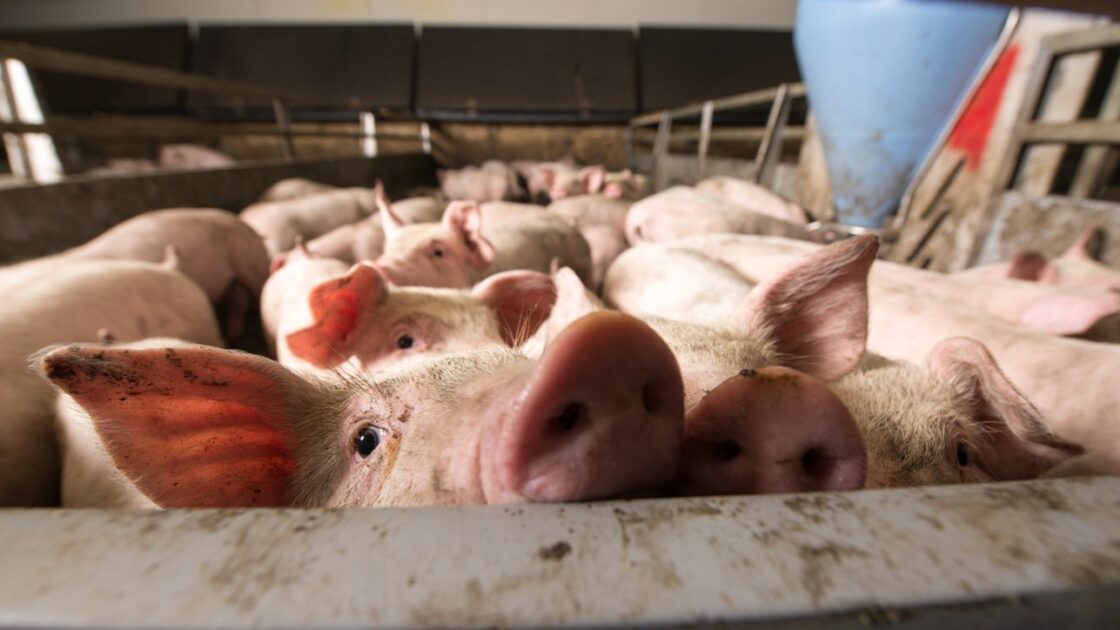Nearly 1 Million North Carolinians Affected by Hog Farm Pollution, Reports EWG

The Environmental Working Group launched interactive mapping software earlier this week to allow North Carolinians to easily search for factory farms near their homes. This announcement came just days after news of a bill that, if passed, would free livestock producers in the state – home to the third largest hog production in the country – from prosecution over the intense odor produced by the farms. Often, civil litigation is the only recourse that families affected by the hog farm smell have.
The state House voted 68-47 to approve House Bill 467 on April 10, thus moving the bill to the Senate.
The mapping project was created by cross-referencing data from an EWG investigation last fall that pinpointed poultry and swine farms in the state with data from tax assessors delineating individual property lines. Using this information, EWG deduced that 60,000 tracts of land were within a half-mile of an industrial-scale chicken or hog farm or the open pits that hold the liquid manure of the swine from these farms. Thanks to U.S. Census data, the EWG was able to estimate that 160,000 North Carolinians live within a half mile of these factory farms.
A 2013 study showed that the health effects, pollution, and odor from factory farms can carry three miles or more, suggesting that the bill could actually impact 960,000 people, an estimate that EWG President Kenneth Cook expects to grow as the analysis continues over the next few days.
Cook notes that the “point of this exercise” was to highlight the fact that farmers pushing for an additional measure of protection were actually impinging on the property rights of many others.
“The basis of your being able to enjoy your property is that you have certain rights to do what you want on it,” says Cook. “The problem is that hog pollution, the smell and the air pollution that triggers asthma, it doesn’t stay on the farmer’s property.”
The most impacted counties are those in eastern North Carolina, including Duplin County, where more than one-fifth of the population is within a half-mile of a factory farm or manure pit. Cook also notes that a disproportionate number of the people affected are low-income Black families, many of whom may not know their rights are being taken away by this legislation.
“This [legislation] would basically take away most of the motivation for [suing], because there’s a cap on the penalties and other restrictions in the legislation that make it unattractive,” explains Cook.
According to EWG, the bill is a “brazen special favor” for the pork industry, specifically for the Chinese-owned Smithfield Foods, the largest pork producer in the world, which, according to EWG, would be “the biggest benefactor” of the bill.
Smithfield is owned by the WH Group of China, which a 2014 PBS Newshour investigation showed is controlled by the Communist Chinese Government.
Donors associated with both Smithfield and Big Pork have contributed heavily to Representative Jimmy Dixon, the bill’s primary sponsor, reports Durham-based newspaper INDY Week, with $115,000 donated from the pork industry in general and more than $36,000 from donors associated with Murphy-Brown, a Smithfield subsidiary.
“The simple truth is that many lawmakers elected to represent the interests of North Carolinians are trying to snatch away their property rights at the behest of a multibillion-dollar corporation controlled by the Communist Chinese government,” said Cook. “The legislation is certainly consistent with how property rights and pollution control are handled in Communist China. First they take away clean air and clean water, then without notifying those affected they take away the legal right to do anything about it.”
Related on Organic Authority
Factory Farms Exposed: A New Book Goes Behind the Barn Door
Organic Milk and Egg Producers Accused of ‘Factory Farm’ Conditions that Violate Organic Law
Cheap Burgers and Factory Farms: Why is Our Meat Industry So Broken?

